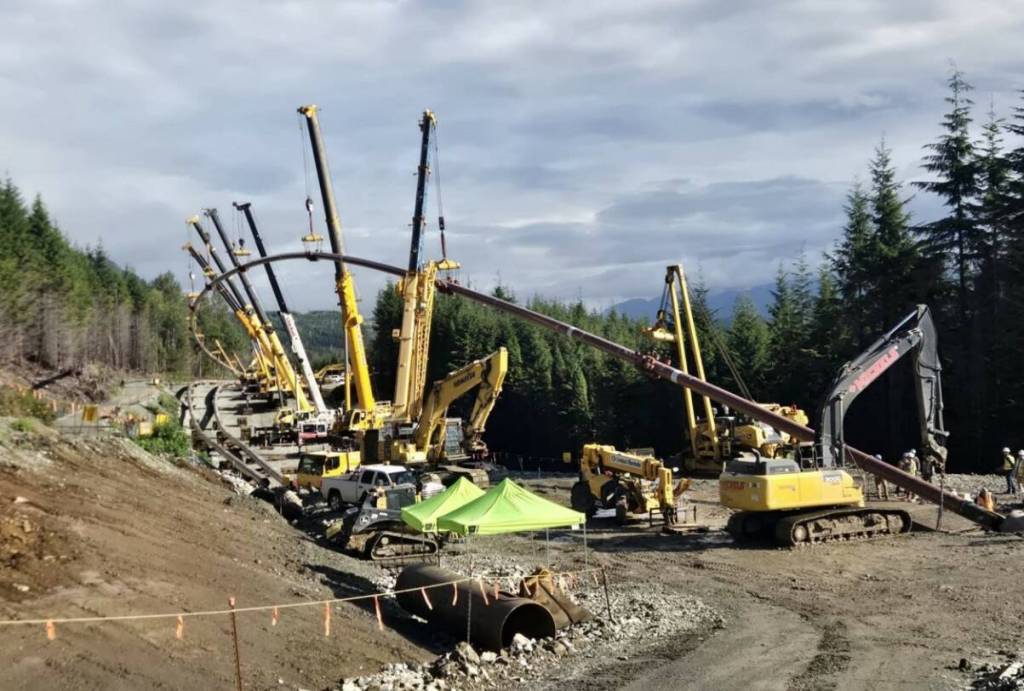
News
October 27, 2025
Kitimat worries ‘fly-in, fly-out’ LNG worker housing will shortchange locals
Town concerned about Cedar LNG offshore plans, firm wants to ‘dispel with the misunderstandings’
Kitimat, British Columbia – Residents of Kitimat are expressing concerns that the proposed Cedar LNG project's reliance on "fly-in, fly-out" (FIFO) worker housing will negatively impact the local economy and community. The anxieties stem from the offshore nature of the Cedar LNG project and the potential for a significant portion of the workforce to be housed in accommodations separate from the town, thus limiting their engagement with local businesses and services.
The Cedar LNG project, a partnership between the Haisla Nation and Pembina Pipeline Corporation, aims to build a floating LNG facility on the Douglas Channel near Kitimat. While the project promises economic benefits and job creation, the proposed FIFO model has sparked worries about the distribution of these benefits within the community.
Concerns voiced by local residents include the potential for reduced spending at local restaurants, shops, and other establishments. They argue that a workforce largely confined to project-provided accommodations will not contribute significantly to the local economy, essentially shortchanging Kitimat of the economic boost it was anticipating. There are also worries about the social impact, with some residents suggesting that a transient workforce might not integrate into the community or contribute to its long-term well-being.
In response to these concerns, Cedar LNG representatives have stated their intention to address these misunderstandings and work collaboratively with the community. The company aims to “dispel with the misunderstandings” surrounding the housing plans and demonstrate their commitment to ensuring that Kitimat benefits fully from the project. Specific strategies for community engagement and maximizing local economic opportunities are expected to be outlined in the coming weeks.
The debate highlights a common tension in resource-dependent communities, where the promise of economic growth is often weighed against concerns about social and environmental impacts. The success of Cedar LNG in Kitimat may well depend on its ability to strike a balance between its operational needs and the needs and expectations of the local community. Further consultations and transparent communication will be critical in fostering a positive relationship and ensuring that the project delivers lasting benefits to Kitimat. The community awaits further details on Cedar LNG's plans to address these concerns and ensure that the project truly benefits the town.
The Cedar LNG project, a partnership between the Haisla Nation and Pembina Pipeline Corporation, aims to build a floating LNG facility on the Douglas Channel near Kitimat. While the project promises economic benefits and job creation, the proposed FIFO model has sparked worries about the distribution of these benefits within the community.
Concerns voiced by local residents include the potential for reduced spending at local restaurants, shops, and other establishments. They argue that a workforce largely confined to project-provided accommodations will not contribute significantly to the local economy, essentially shortchanging Kitimat of the economic boost it was anticipating. There are also worries about the social impact, with some residents suggesting that a transient workforce might not integrate into the community or contribute to its long-term well-being.
In response to these concerns, Cedar LNG representatives have stated their intention to address these misunderstandings and work collaboratively with the community. The company aims to “dispel with the misunderstandings” surrounding the housing plans and demonstrate their commitment to ensuring that Kitimat benefits fully from the project. Specific strategies for community engagement and maximizing local economic opportunities are expected to be outlined in the coming weeks.
The debate highlights a common tension in resource-dependent communities, where the promise of economic growth is often weighed against concerns about social and environmental impacts. The success of Cedar LNG in Kitimat may well depend on its ability to strike a balance between its operational needs and the needs and expectations of the local community. Further consultations and transparent communication will be critical in fostering a positive relationship and ensuring that the project delivers lasting benefits to Kitimat. The community awaits further details on Cedar LNG's plans to address these concerns and ensure that the project truly benefits the town.
Category:
Business